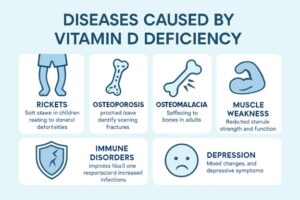
10 Sep Vitamin D Test – Why It Matters for Your Health
Vitamin D Test – Why It Matters for Your Health
 Vitamin D is often called the “sunshine vitamin” because our body makes it when we spend time in sunlight. It is crucial for the health of our bones, muscles, and general well-being. Many people are unaware that low vitamin D levels can lead to major health issues like mood swings, fatigue, body pain, and weak bones.
Vitamin D is often called the “sunshine vitamin” because our body makes it when we spend time in sunlight. It is crucial for the health of our bones, muscles, and general well-being. Many people are unaware that low vitamin D levels can lead to major health issues like mood swings, fatigue, body pain, and weak bones.
A straightforward blood test called a vitamin D test can determine whether your body has adequate amounts of the vitamin. We’ll go over the importance of vitamin D, when to get tested, what the test reveals, and how it can help you stay healthy in this blog post.
What is Vitamin D?
One nutrient that aids in the body’s absorption of calcium and phosphorus—two minerals that strengthen bones—is vitamin D. Vitamin D deficiency can cause bones to weaken and break easily. In addition to bone health, vitamin D promotes:
- Immunity – helps the body fight infections.
- Muscle strength – reduces weakness and cramps.
- Mood balance – linked with mental health.
- Heart health – supports normal blood pressure and heart function.
What Makes Vitamin D Vital?
Consider vitamin D to be the “key” that allows our bodies to access calcium. Your body cannot use calcium effectively without vitamin D, even if you consume foods high in calcium, such as milk, cheese, or green vegetables. For this reason, those who are vitamin D deficient frequently experience issues such as:
- Regular joint or body pain
- Fatigue and weakness
- Fractures of the bones
- Children’s delayed growth
- Low mood or depression

Typical Causes of Vitamin D Deficiency
Even in sunny countries like India, vitamin D deficiency is very common these days. The following are a few causes:
Less sunlight exposure – Utilizing sunscreen constantly, working in offices, or spending more time indoors.
Dietary practices: Avoiding foods like dairy, eggs, and fish that are high in vitamin D.
Age factor: Our skin produces less vitamin D as we age.
Health conditions: Vitamin D levels may be impacted by liver or kidney issues.
Skin type: To produce vitamin D, darker skin requires more sunlight.
Who Needs a Test for Vitamin D?
Although some people are more likely to have a deficiency than others, not everyone requires this test:
- Individuals who stay inside most of the time.
- Senior citizens.
- Dark-skinned people absorb less sunlight.
- Those who frequently apply sunscreen.
- Those who suffer from joint or bone issues.
- People who suffer from diabetes, obesity, or long-term illnesses.
- Pregnant women and nursing mothers.
- Youngsters with rickets or poor growth.
How is the test for vitamin D conducted?
It’s an easy and quick process:
- An individual from the medical field draws a tiny amount of blood from your arm.
- For analysis, the sample is sent to the diagnostic lab.
- Typically, results are accessible in a day or two.
There is no need for special preparation. Before the test, you can eat and drink as you normally would.
Normal Levels of Vitamin D
Results for vitamin D are typically displayed in nanograms per milliliter (ng/mL). The typical range is as follows:
- Less than 20 ng/mL indicates a deficit.
- 20–29 ng/mL → Not enough
- 30 to 50 ng/mL = Adequate/Normal
- Higher than 100 ng/mL → High (may be hazardous)
Your physician will explain the findings and, if necessary, provide treatment guidance.
What if your vitamin D levels are low?
You should not be concerned if your vitamin D level is low. The following can be used to fix it:
- More exposure to sunlight (the best is in the morning).
- Foods high in vitamin D, such as fish, eggs, milk, and fortified cereals.
- Vitamin D supplements (only when prescribed by a physician).
In rare instances, if the deficiency is extremely severe, doctors may also recommend vitamin D injections.
Benefits of Getting Vitamin D Test
- Identifies deficiencies early.
- Aids in the prevention of disorders affecting the bones.
- Boosts vitality and immunity.
- Encourages more effective treatment planning for other ailments.
- Knowing your vitamin D level gives you peace of mind.
How Frequently Is Testing Necessary?
- Once a year is sufficient if you are in good health.
- Your doctor might recommend testing every three to six months to track improvement if you are already deficient or at risk.
How to Maintain Healthy Vitamin D Levels
If you maintain a few basic habits, maintaining vitamin D is not too difficult.
Get some sunlight: At least three or four times a week, try to get 15 to 20 minutes of early morning sunlight. Your body naturally produces vitamin D with the aid of sunlight.
Eat foods high in vitamin D : Eat more eggs, milk, curd, cheese, fish, mushrooms, and fortified cereals. These foods provide additional vitamin D to your body.
Stay active: Frequent outdoor exercise provides you with beneficial exposure to sunlight and helps you stay in shape.
Take supplements if necessary: Your doctor might recommend tablets or drops if your test results indicate extremely low vitamin D levels. Take them only as directed by a doctor.
Get regular checkups: To be safe, have your vitamin D levels checked periodically if you are at risk of deficiency.
You can simply maintain your vitamin D levels within the normal range by combining sunlight, a nutritious diet, and prompt medical advice.
Risks of Ignoring Vitamin D Deficiency
Many people disregard weakness, back pain, or fatigue without realizing that low vitamin D may be the cause. Deficiency, if untreated, can result in:
- Fragile and feeble bones
- Osteoporosis and increased fracture risk
- Joint pain and weakened muscles
- Poor immunity and recurrent infections
- Rickets or delayed growth in children
For long-term health, it is crucial to get a vitamin D test at the appropriate time.
Facts and Myths Regarding Vitamin D
Vitamin D is the subject of numerous widespread myths. Let’s address a few of them:
Myth: Vitamin D is produced when you sit by a sunny window.
Fact: You must be exposed to the sun directly because glass blocks UV rays.
Myth: Deficiency in vitamin D only affects the elderly.
Fact: Inadequate behavior can occur in children and young adults alike.
Myth: Vitamin D can be obtained from a healthy diet alone.
Fact: Food is insufficient on its own; sunlight remains the primary source.
Myth: Vitamin D levels are always higher.
Fact: Balance is essential because extremely high levels can be harmful.
Conclusion
An important nutrient that maintains strong bones, muscular activity, and a robust immune system is vitamin D. Sadly, deficiencies are quite common these days, but the good news is that they are easily identified with a vitamin D test and can be properly treated.
Do not disregard any symptoms if experiencing, such as fatigue, bone pain, or weakened immunity. A fast and accurate vitamin D test can be obtained at Lab Vision Diagnostic Centre LLP. You and your family can stay safe, active, and healthy with routine testing.


No Comments